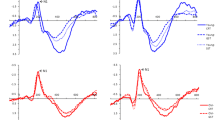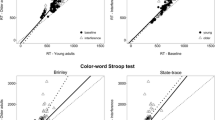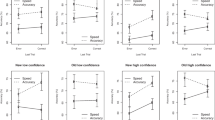Abstract
This study aims to investigate how older adults react to a failed-inhibition error while performing a stop-signal task. That is, whether elderly people would exhibit enlarged post-error slowing and whether such slowing revealed an adaptive process, maladaptive process, or a mixture of maladaptive followed by adaptive processes. This study also addresses if the post-error process might further interact with a stimulus repetition effect based on the memory retrieval explanation. A group of 34 younger adults (age range 20–30 years) and a group of 34 older adults (age range 60–80 years) were included for the analyses. The results of the current study supported a mixture model by showing that older adults exhibited a larger post-error slowing than younger adults, and their post-error slowing was initially accompanied by deceased accuracy that then increased on the subsequent trial. Furthermore, such post-error slowing on older adults only occurred in the trial condition where the stimulus was repeated from the previous trial suggesting a memory-based process (a form of negative priming) involved in post-error processes. The implication of the current finding is that older adults might maintain the ability to detect and monitor the response error, yet their post-error adjustment might require a much longer time to start functioning well after the initial detrimental orienting response to the error and the entire process was memory-based.




Similar content being viewed by others
Data availability
Data are available upon request if you follow ethical guidelines.
Abbreviations
- SST:
-
Stop-signal task
- SSD:
-
Stop-signal delay
- SSRT:
-
Stop-signal reaction time
- MoCA:
-
Montreal Cognitive Assessment
- BDI-II:
-
Beck Depression Inventory-II
References
Beck, A. T., Steer, R. A., & Brown, G. K. (1996). Beck depression inventory-II. San Antonio, 78(2), 490–498.
Botvinick, M. M., Braver, T. S., Barch, D. M., Carter, C. S., & Cohen, J. D. (2001). Conflict monitoring and cognitive control. Psychological Review, 108(3), 624–652. https://doi.org/10.1037//0033-295x.108.3.624
Chern, H.-C., & Cheng, C.-M. (1999). ANOVA and trend analysis statistical program for cognitive experiments. Research in Applied Psychology, 1, 229–246.
Cheyne, J. A., Carriere, J. S., Solman, G. J., & Smilek, D. (2011). Challenge and error: critical events and attention-related errors. Cognition, 121(3), 437–446.
Danielmeier, C., & Ullsperger, M. (2011). Post-error adjustments. Frontiers in Psychology, 2, 233.
Danielmeier, C., Eichele, T., Forstmann, B. U., Tittgemeyer, M., & Ullsperger, M. (2011). Posterior medial frontal cortex activity predicts post-error adaptations in task-related visual and motor areas. Journal of Neuroscience, 31(5), 1780–1789.
Debener, S., Ullsperger, M., Siegel, M., Fiehler, K., Von Cramon, D. Y., & Engel, A. K. (2005). Trial-by-trial coupling of concurrent electroencephalogram and functional magnetic resonance imaging identifies the dynamics of performance monitoring. Journal of Neuroscience, 25(50), 11730–11737.
Eichele, H., Juvodden, H., Ullsperger, M., & Eichele, T. (2010). Mal-adaptation of event-related EEG responses preceding performance errors. Frontiers in Human Neuroscience, 4, 65.
Enticott, P. G., Bradshaw, J. L., Bellgrove, M. A., Upton, D. J., & Ogloff, J. R. (2009). Stop task after-effects: the extent of slowing during the preparation and execution of movement. Experimental Psychology, 56(4), 247–251.
Falkenstein, M., Hoormann, J., & Hohnsbein, J. (2001). Changes of error-related ERPs with age. Experimental Brain Research, 138(2), 258–262.
Fiehler, K., Ullsperger, M., & Von Cramon, D. Y. (2005). Electrophysiological correlates of error correction. Psychophysiology, 42(1), 72–82. https://doi.org/10.1111/j.1469-8986.2005.00265.x
Howell, D. C. (2012). Statistical Methods for Psychology. Cengage Learning.
Gehring, W. J., & Knight, R. T. (2000). Prefrontal–cingulate interactions in action monitoring. Nature Neuroscience, 3(5), 516–520.
Gehring, W. J., Goss, B., Coles, M. G., Meyer, D. E., & Donchin, E. (1993). A neural system for error detection and compensation. Psychological Science, 4(6), 385–390.
Jentzsch, I., & Dudschig, C. (2009). Why do we slow down after an error? mechanisms underlying the effects of posterror slowing. The Quarterly Journal of Experimental Psychology, 62(2), 209–218.
Laming, D. R. J. (1968). Information theory of choice-reaction times. Academic Press.
Laming, D. (1979). Choice reaction performance following an error. Acta Psychologica, 43(3), 199–224.
Logan, G. (1988). Toward an instance theory of automatization. Psychological Review, 95, 492–527.
Marco-Pallarés, J., Camara, E., Münte, T. F., & Rodríguez-Fornells, A. (2008). Neural mechanisms underlying adaptive actions after slips. Journal of Cognitive Neuroscience, 20(9), 1595–1610.
Mathalon, D. H., Bennett, A., Askari, N., Gray, E. M., Rosenbloom, M. J., & Ford, J. M. (2003). Response-monitoring dysfunction in aging and Alzheimer’s disease: an event-related potential study. Neurobiology of Aging, 24(5), 675–685.
Nasreddine, Z. S., Phillips, N. A., Bedirian, V., Charbonneau, S., Whitehead, V., Collin, I., & Chertkow, H. (2005). The montreal cognitive assessment, MoCA: a brief screening tool for mild cognitive impairment. Journal of the American Geriatrics Society, 53(4), 695–699. https://doi.org/10.1111/j.1532-5415.2005.53221.x
Nieuwenhuis, S., Ridderinkhof, K. R., Talsma, D., Coles, M. G., Holroyd, C. B., Kok, A., & Van der Molen, M. W. (2002). A computational account of altered error processing in older age: dopamine and the error-related negativity. Cognitive, Affective, & Behavioral Neuroscience, 2(1), 19–36.
Notebaert, W., Houtman, F., Van Opstal, F., Gevers, W., Fias, W., & Verguts, T. (2009). Post-error slowing: an orienting account. Cognition, 111(2), 275–279.
Pesta, J., Raymond, E., & Sanders, B. (2000). Aging and negative priming: Is ignored information inhibited or remembered? Experimental Aging Research, 26(1), 37–56.
Polich, J. (2007). Updating P300: An integrative theory of P3a and P3b. Clinical Neurophysiology, 118(10), 2128–2148.
Rabbitt, P. M. (1966). Errors and error correction in choice-response tasks. Journal of Experimental Psychology, 71(2), 264.
Rabbitt, P., & Rodgers, B. (1977). What does a man do after he makes an error? an analysis of response programming. Quarterly Journal of Experimental Psychology, 29(4), 727–743. https://doi.org/10.1080/14640747708400645
Rey-Mermet, A., Gade, M., & Oberauer, K. (2018). Should we stop thinking about inhibition? Searching for individual and age differences in inhibition ability. Journal of Experimental Psychology: Learning, Memory, and Cognition, 44(4), 501.
Ridderinkhof, K. R. (2002a). Activation and suppression in conflict tasks: empirical clarification through distributional analyses. In W. Prinz & B. Hommel (Eds.), Common mechanisms in perception and action (pp. 494–519). Oxford: Oxford University Press.
Ridderinkhof, R. K. (2002b). Micro-and macro-adjustments of task set: activation and suppression in conflict tasks. Psychological Research Psychologische Forschung, 66(4), 312–323.
Ruitenberg, M. F. L., Abrahamse, E. L., De Kleine, E., & Verwey, W. B. (2014). Post-error slowing in sequential action: an aging study. Frontiers in Psychology. https://doi.org/10.3389/fpsyg.2014.00119
Smith, G. A., & Brewer, N. (1995). Slowness and age - speed accuracy mechanisms. Psychology and Aging, 10(2), 238–247. https://doi.org/10.1037/0882-7974.10.2.238
Starns, J. J., & Ratcliff, R. (2010). The effects of aging on the speed-accuracy compromise: boundary optimality in the diffusion model. Psychology and Aging, 25(2), 377–390. https://doi.org/10.1037/a0018022
Steinhauser, M., Ernst, B., & Ibald, K. W. (2017). Isolating component processes of posterror slowing with the psychological refractory period paradigm. Journal of Experimental Psychology: Learning, Memory, and Cognition, 43, 653–659.
Ullsperger, M., & Danielmeier, C. (2016). Reducing speed and sight: How adaptive is post-error slowing? Neuron, 89(3), 430–432. https://doi.org/10.1016/j.neuron.2016.01.035
Ullsperger, M., Danielmeier, C., & Jocham, G. (2014). Neurophysiology of performance monitoring and adaptive behavior. Physiological Reviews, 94(1), 35–79. https://doi.org/10.1152/physrev.00041.2012
Upton, D. J., Enticott, P. G., Croft, R. J., Cooper, N. R., & Fitzgerald, P. B. (2010). ERP correlates of response inhibition after-effects in the stop signal task. Experimental Brain Research, 206(4), 351–358.
Verbruggen, F., & Logan, G. D. (2009). Models of response inhibition in the stop-signal and stop-change paradigms. Neuroscience and Biobehavioral Reviews, 33(5), 647–661. https://doi.org/10.1016/j.neubiorev.2008.08.014
Verbruggen, F., Logan, G. D., & Stevens, M. A. (2008). STOP IT: windows executable software for the stop-signal paradigm. Behavior Research Methods, 40(2), 479–483. https://doi.org/10.3758/Brm.40.2.479
Verbruggen, F., Chambers, C. D., & Logan, G. D. (2013). Fictitious inhibitory differences: How skewness and slowing distort the estimation of stopping latencies. Psychological Science, 24(3), 352–362. https://doi.org/10.1177/0956797612457390
Acknowledgements
We thank the Mind Research and Imaging Center (MRIC), supported by MOST, at NCKU for consultation and instrument availability. This work was supported by the Ministry of Science and Technology (MOST), Taiwan, for financially supporting this research [Contract No. 104-2410-H-006-021-MY2, 106-2410-H-006-031-MY2, 108-2321-B-006-022-MY2, MOST 108-2410-H-006 -038-MY3, MOST 110-2321-B-006-004].
Funding
This work was supported by the Ministry of Science and Technology (MOST), Taiwan, for financially supporting this research [Contract No. 104-2410-H-006-021-MY2, 106-2410-H-006-031-MY2, 108-2321-B-006-022-MY2, MOST 108-2410-H-006-038-MY3, MOST 110-2321-B-006-004].
Author information
Authors and Affiliations
Contributions
HH designed the analysis protocol, analyzed the data, and drafted and revised the manuscript. SH applied for the research funding, designed the research protocol, supervised data analyses, and rewrote and revised the manuscript.
Corresponding author
Ethics declarations
Conflict of interest
The authors declare that the research was conducted in the absence of any commercial or financial relationships that could be construed as a potential conflict of interest.
Ethical approval
Procedures were carried out under ethical approval obtained from the National Cheng Kung University Research Ethics Committee (NO. 104-004).
Consent to participate
Participants provided written informed consent before beginning the experiment.
Additional information
Publisher's Note
Springer Nature remains neutral with regard to jurisdictional claims in published maps and institutional affiliations.
Rights and permissions
About this article
Cite this article
Hsu, H.M., Hsieh, S. Age-related post-error slowing and stimulus repetition effect in motor inhibition during a stop-signal task. Psychological Research 86, 1108–1121 (2022). https://doi.org/10.1007/s00426-021-01551-0
Received:
Accepted:
Published:
Issue Date:
DOI: https://doi.org/10.1007/s00426-021-01551-0




